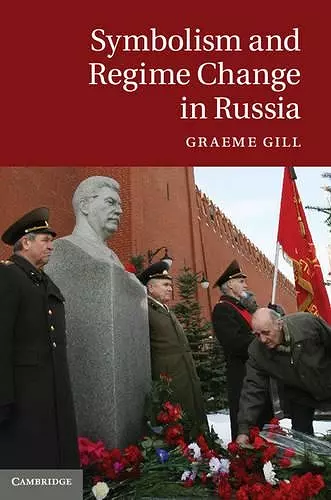Symbolism and Regime Change in Russia
Format:Hardback
Publisher:Cambridge University Press
Published:17th Jan '13
Currently unavailable, and unfortunately no date known when it will be back

Asks why regime change in Russia has not been accompanied by a coherent new political symbolism.
Regime change in Russia has not been accompanied by a coherent new system of political symbolism. Following the fall of the Soviet regime, no single symbolic programme has emerged to replace the Soviet version. Gill investigates why and examines the symbolism that in fact emerged.During the Soviet period, political symbolism developed into a coherent narrative that underpinned Soviet political development. Following the collapse of the Soviet regime and its widespread rejection by the Russian people, a new form of narrative was needed, one which both explained the state of existing society and gave a sense of its direction. By examining the imagery contained in presidential addresses, the political system, the public sphere and the urban development of Moscow, Graeme Gill shows how no single coherent symbolic programme has emerged to replace that of the Soviet period. Laying particular emphasis on the Soviet legacy, and especially on the figure of Stalin, Symbolism and Regime Change in Russia explains why it has been so difficult to generate a new set of symbols which could constitute a coherent narrative for the new Russia.
'How does a country see itself and make sense of its past and place in the world? In this groundbreaking book, Graeme Gill builds on his earlier work on Symbols and Legitimacy in Soviet Politics to take the story into the post-Soviet era. The fall of communism entailed not only institutional change but a drastic transformation of the symbolic universe, accompanied by the formation of new narrative structures and attempts to reshape the physical environment. This book is an original and thought-provoking study of how contemporary Russia sees itself and tries to shape how it should be seen.' Richard Sakwa, University of Kent
'Gill provides a welcome shift in the focus of post-communist politics, away from the conflicts over property and patronage to the struggle over a new form of symbolic discourse. Every nation needs a convincing mythology of its identity and history, yet contemporary Russian elites have been unable to replace the Soviet meta-narrative with a suitable alternative, in part because of the population's own ambiguous attitude to the past. Where traditional works examine the consolidation of democracy (or authoritarianism) in Russia, Gill reminds us that an even more pressing task is the consolidation of a coherent national narrative, without which the regime's legitimacy will remain suspect.' Eugene Huskey, William R. Kenan, Jr Professor of Political Science, Stetson University, and author of Presidential Power in Russia
'A fresh and compelling reading of the post-Soviet experience, organised around an examination of the attempt to construct a substitute for the 'metanarrative' that was dominant in earlier years. That means much more than leadership statements and official documents - for the purposes of this analysis, it extends to language, physical environment and complex issues of 'identity' as well as reinterpretations of the historical record. This will be an influential interpretation; it may be a paradigm-changing one.' Stephen White, University of Glasgow
ISBN: 9781107031395
Dimensions: 235mm x 158mm x 17mm
Weight: 510g
326 pages